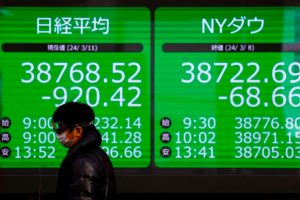(ATF) According to reports in China and Iranian state TV, the central bank of Iran has announced numerous changes, including that it now lists the yuan as the country’s main foreign exchange currency, in place of the US dollar.
This news is not a great surprise. It comes amid expanding business transactions and cooperation with China, while the US has implemented a policy of ‘Maximum pressure’ on Iran in the two years since the Trump administration withdrew from the 2015 multilateral nuclear agreement (the Joint Comprehensive Plan of Action or JCPOA signed with the Obama administration and major European states).
Relations between Iran and the US have deteriorated as the Iranian economy has sunk into a deep recession, as oil exports plunged and unemployment rose. Tensions between the two countries soared after the US military killed Qasem Soleimani, the commander of the Iran’s Islamic Revolutionary Guard Corps or Quds Force, in an airstrike in Baghdad on January 3, 2020. The two countries have appeared to be on the brink of additional hostilities, with attacks by Iran-backed groups on bases in Iraq inhabited by US forces, plus Iranian forces accused of attacks and the seizure of commercial ships in the Gulf, destroying critical infrastructure in the Arab states, and allegedly harassing US warships as part of its “maximum resistance” policy.
Earlier this year Iran announced its own digital currency, which is being used for oil transactions to avoiding the SWIFT international money transfer and payment system.
In China, the media response to the change has been positive.
“This may become the east wind for the renminbi (yuan) and provide a new oil currency option for traders in oil-producing countries, including Iran,” an editorial on qq.com said.
Press TV in Tehran said the Iranian Ministry of Trade reported that in the six months to September 23 the country’s manufacturing activity had increased by nearly 15%, despite US sanctions. Iran’s production and exports of non-crude oil products also allegedly rose significantly, to a total export value of more than $13.5 billion. On October 3, the chief economist of the Iranian Central Bank, said that the country’s fiscal revenue increased by 5.4% in the first half of the year.
At the same time, in order to offset the impact of the US sanctions, Iran has been pushing various plans to differentiate the economy from its dependence on oil. This has led to a change in tactics in regard to Iran’s crude oil exports and financial interaction with Iranian oil buyers to provide funds to Iran.
Developing crypto and digital currency
Press TV said three weeks ago that several large banks in Iran were developing a gold encrypted digital currency called PayMon and had issued more than 1,000 crypto-currency mining licenses, which could promote the development of crude oil. Domestic traders use cryptocurrency to import goods and bypass American banks.
Earlier, the project also received public support from Malaysian authorities, which have abundant oil resources. The central bank of Iran has also established a blockchain currency research department to develop a digital currency anchored to its own currency. To this end, Iran opened a huge 5G data centre on October 1 to improve its national information Network (NIN) traffic and data exchange, as the country seeks to reduce its reliance on global servers for critical and sensitive online services.
Chinese website Baijiahao’s team of financial analysts noticed that the chief banker at Iran’s central bank said on September 28 that relevant Iranian authorities have found innovative ways to bypass US sanctions on the sale of oil and non-crude oil. According to a speech by Iran’s Deputy Minister of Industry two weeks ago, Iran exported US$63.5 billion worth of non-crude oil products in the 12 months to September.
Meanwhile, officials at the Iranian-Swiss Joint Chamber of Commerce were quoted by Iran’s Press TV on October 5, as saying Switzerland’s first deal with Iran under the SHTA trade mechanism, is now planned to expand. It indicates that Iran’s cooperation with Swiss companies has already bypassed the US dollar – this was reportedly the first time that funds from the Iranian central bank had bypassed US sanctions and been processed by a European bank. But, Switzerland had received a special exemption from US supervisory authorities to allow the SHTA operations.
























